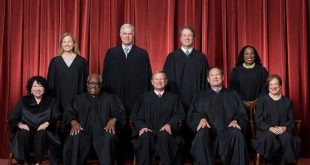The city of Grants Pass, Oregon, restricts camping on public property and sleeping overnight in the city’s parks. Violations trigger fines and imprisonment.
A group of homeless people filed a class action lawsuit against the city. The U.S. Court of Appeals for the Ninth Circuit ruled that the city’s laws amounted to cruel and unusual punishments under the Eighth Amendment because the city didn’t have enough beds for the homeless.
The U.S. Supreme Court last week disagreed with the Ninth Circuit. By a vote of 6-3, the high court held that enforcing generally applicable laws regulating camping on public property does not constitute cruel and unusual punishments prohibited by the Eighth Amendment. The court issued the opinion (PDF) issued last week.
“The Court cannot say that the punishments Grants Pass imposes here qualify as cruel and unusual,” Justice Neil Gorsuch wrote. “The city imposes only limited fines for first-time offenders, an order temporarily barring an individual from camping in a public park for repeat offenders, and a maximum sentence of 30 days in jail for those who later violate an order.”
The court said the punishments aren’t unusual, either, “because similarly limited fines and jail terms have been and remain among ‘the usual mode[s]’ for punishing criminal offenses throughout the country.”
The high court reversed the Ninth Circuit’s decision and remanded the case.
Becket Law had submitted an amicus brief in the case. In determining the number of beds in Grants Pass, the Ninth Circuit didn’t count beds in faith-based shelters and relied on a “wrongheaded legal standard” in doing so, Becket Law contended.
The legal firm said the appeals court relied on the old Lemon test, which it says the high court set aside in Kennedy v. Bremerton School District (2022).
The court in Lemon v. Kurtzman (1971) adopted a three-prong test to determine whether a law violates the Establishment Clause, which states that Congress shall make no law respecting the establishment of religion. The law must have a secular purpose, the law’s primary purpose must neither advance nor inhibit religion, and the law must not result in excessive government entanglement with religion.
“Lemon’s specter still casts a dark shadow across the country, including the Ninth Circuit,” said Daniel Chen, a lawyer at Becket. “The Justices should remind courts that it has already banished this phantom doctrine from our nation’s law so that it can no longer haunt religious people and institutions.”
Photo credit: KOMUnews (Creative Commons) – Some rights reserved
 CURE News and Clergy Blog News and Commentary for Christians
CURE News and Clergy Blog News and Commentary for Christians



